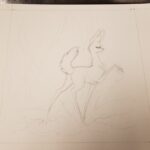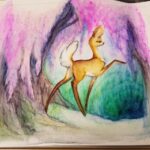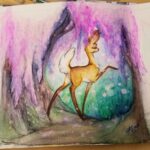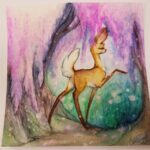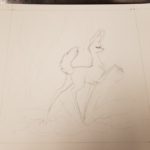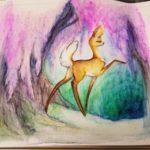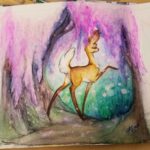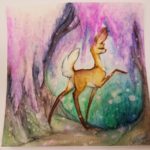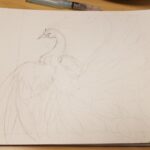Month: October 2016
Personality; not just for humans
We usually see “elephants”—or “wolves” or “killer whales” or “chimps” or
“ravens” and so on—as interchangeable representatives of their kind.
But the instant we focus on individuals, we see an elephant named Echo
with exceptional leadership qualities; we see wolf 755 struggling to
survive the death of his mate and exile from his family; we see a lost
and lonely killer whale named Luna who is humorous and stunningly
gentle. We see individuality. It’s a fact of life. And it runs deep.
Very deep.Individuality
is the frontier of understanding non-human animals. But for decades, the
idea was forbidden territory. Scientists who stepped out of bounds
faced withering scorn from colleagues. Jane Goodall experienced just
that. After her first studies of chimpanzees, she enrolled as a doctoral
student at Cambridge. There, as she later recalled in National
Geographic, “It was a bit shocking to be told I’d done everything wrong.
Everything. I shouldn’t have given them names. I couldn’t talk about
their personalities, their minds or their feelings.” The orthodoxy was:
those qualities are unique to humans.But these
decades later we are realizing that Goodall was right; humans are not
unique in having personalities, minds and feelings. And if she’d given
the chimpanzees numbers instead of names?—their individual personalities
would still have shined.“If ever there
was a perfect wolf,” says Yellowstone biologist Rick McIntyre, “It was
Twenty-one. He was like a fictional character. But real.” McIntyre has watched free-living wolves for
more hours than anyone, ever.Even from a
distance Twenty-one’s big-shouldered profile was recognizable. Utterly
fearless in defense of his family, Twenty-one had the size, strength,
and agility to win against overwhelming odds. “On two occasions, I saw
Twenty-one take on six attacking wolves—and rout them all,” Rick says.
“Watching him felt like seeing something that looked supernatural. Like
watching a Bruce Lee movie. I’d be thinking, ‘A wolf can’t do what I am
watching this wolf do.’” Watching Twenty-one, Rick elaborates, “was like
watching Muhammad Ali or Michael Jordan—a one-of-a-kind talent outside
of ‘normal.’”Twenty-one was a
superwolf. Uniquely, he never lost a fight and he never killed any
defeated opponent. And yet Twenty-one was “remarkably gentle” with the
members of his pack. Immediately after making a kill he would often walk
away and nap, allowing family members who’d had nothing to do with the
hunt eat their fill.One
of Twenty-one’s favorite things was to wrestle little pups. “And what
he really loved to do,” Rick adds, “was pretend to lose. He just got a
huge kick out of it.” Here was this great big male wolf. And he’d let
some little wolf jump on him and bite his fur. “He’d just fall on his
back with his paws in the air,” Rick half-mimes. “And the
triumphant-looking little one would be standing over him with his tail
wagging.“The ability to
pretend,” Rick adds, “shows that you understand how your actions are
perceived by others. I’m sure the pups knew what was going on, but it
was a way for them to learn how it feels to conquer something much
bigger than you. And that kind of confidence is what wolves need every
day of their hunting lives.”In Twenty-one’s
life, there was a particular male, a sort of roving Casanova, a
continual annoyance. He was strikingly good-looking, had a big
personality, and was always doing something interesting. “The best
single word is ‘charisma,’” says Rick. “Female wolves were happy to mate
with him. People absolutely loved him. Women would take one look at
him—they didn’t want you to say anything bad about him. His
irresponsibility and infidelity; it didn’t matter.”One day,
Twenty-one discovered this Casanova among his daughters. Twenty-one ran
in, caught him, biting and pinning him to the ground. Other pack members
piled in, beating Casanova up. “Casanova was also big,” Rick says, “but
he was a bad fighter.” Now he was totally overwhelmed; the pack was
finally killing him.“Suddenly
Twenty-one steps back. Everything stops. The pack members are looking at
Twenty-one as if saying, ‘Why has Dad stopped?’” The Casanova wolf
jumped up and—as always—ran away.After
Twenty-one’s death, Casanova briefly became the Druid pack’s alpha male.
But, Rick recalled: “He doesn’t know what to do, just not a leader
personality.” And although it’s very rare, his year-younger brother
deposed him. “His brother had a much more natural alpha personality.”
Casanova didn’t mind; it meant he was free to wander and meet other
females. Eventually Casanova and several young Druid males met some
females and they all formed the Blacktail pack. “With them,” Rick
remembers, “he finally became the model of a responsible alpha male and a
great father.”The personality of a wolf ‘matriarch’ also helps shape the
whole pack. Wolf Seven was the dominant female in her pack. But you
could watch Seven for days and say, ‘I think she’s in charge,’ because
she led subtly, by example. Wolf Forty, totally different; she led with
an iron fist. Exceptionally aggressive, Forty had done something unheard
of: actually deposed her own mother.For three
years, Forty ruled the Druid pack tyrannically. A pack member who stared
a moment too long would find herself slammed to the ground, Forty’s
bared canines poised above her neck. Yellowstone research director Doug
Smith recalls, “Throughout her life she was fiercely committed to always
having the upper hand, far more so than any other wolf we’ve observed.”
Forty heaped her worst abuse on her same-age sister. Because this sister
lived under Forty’s brutal oppression, she earned the name Cinderella.One year
Cinderella split from the main pack and dug a den to give birth. Shortly
after she finished the den, her sister arrived and delivered one of her
infamous beatings. Cinderella just took it, as always. No one ever saw
any pups at that den.The next year,
Cinderella, Forty, and a low-ranking sister all gave birth in dens dug
several miles apart. New wolf mothers nurse and guard constantly; they
rely on pack members for food. That year, few pack members visited the
bad-tempered alpha. Cinderella, though, found herself well assisted at
her den by several sisters.Six weeks after
giving birth, Cinderella and several attending pack members headed out,
away from her den—and stumbled into the queen herself. Forty
immediately attacked Cinderella with was, even for her, exceptional
ferocity. She then turned her fury onto another of her sisters who’d
been accompanying Cinderella, giving her a beating too. Then as dusk
settled in, Forty headed toward Cinderella’s den. Only the wolves saw
what happened next, but Doug Smith and Rick McIntyre pieced together
what went down.Unlike the
previous year, this time Cinderella wasn’t about to remain passive or
let her sister reach her den and her six-week-old pups. Near the den a
fight erupted. There were at least four wolves, and Forty had earned no
allies among them.At dawn, Forty
was down by the road covered in blood, and her wounds included a neck
bite so bad that her spine was visible. Her long-suffering sisters had,
in effect, cut her throat. She died. It was the only time researchers
have ever known a pack to kill its own alpha. Forty was an
extraordinarily abusive individual. The sisters’ decision, outside the
box of wolf norms, was: mutiny. Remarkable.But Cinderella
was just getting started. She adopted her dead sister’s entire brood.
And she also welcomed her low-ranking sister and her pups. And so that
was the summer that the Druid Peak pack raised an unheard-of twenty-one
wolf pups together in a single den.Out from under Forty’s brutal reign, Cinderella developed into the
pack’s finest hunter. She later went on to become the benevolent
matriarch of the Geode Creek pack. Goes to show: a wolf, as many a
human, may have talents and abilities that wither or flower depending on
which way their luck breaks.“Cinderella was
the finest kind of alpha female,” Rick McIntyre says. “Cooperative,
returning favors by sharing with the other adult females, inviting her
sister to bring her pups together with her own while also raising her
vanquished sister’s pups—. She set a policy of acceptance and cohesion.”
She was, Rick says, “perfect for helping everyone get along really
well.”(This piece is adapted from Carl Safina’s most recent book, Beyond Words; What Animals Think and Feel, which will is newly out in paperback)
I finally have a new computer. It is still lacking a NEW video card and storage, but it is fantastic and runs photoshop and minecraft like a CHAMP. Boy howdy! Once I get my legs straightened out, I will make my internet comeback and how.
I started putting the Dangerous Cute print book together tonight, even…
I finally have a new computer. It is still lacking a NEW video card and storage, but it is fantastic and runs photoshop and minecraft like a CHAMP. Boy howdy! Once I get my legs straightened out, I will make my internet comeback and how.
I started putting the Dangerous Cute print book together tonight, even…
Remember when I used to draw Conan all the time? Yeah…
Anyway, it’s Clover’s birthday, so Conan made her a cake! Sort of. Uh. I wouldn’t eat that if I were you…
Remember when I used to draw Conan all the time? Yeah…
Anyway, it’s Clover’s birthday, so Conan made her a cake! Sort of. Uh. I wouldn’t eat that if I were you…
Daily #1,366! Rush jobs be like…
“I need this done now, but just a sec.”
Facebook || Twitter || Patreon || Smackjeeves
THIS IS ME AT WORK ALMOST EVERY DAY
Here are progress images from the deer! How do you watercolor? I’m still not really sure what I’m doing.
Here are progress images from the deer! How do you watercolor? I’m still not really sure what I’m doing.
This is the sketch of my next painting! It’s at about 50% now… hoping to finish it tomorrow.








